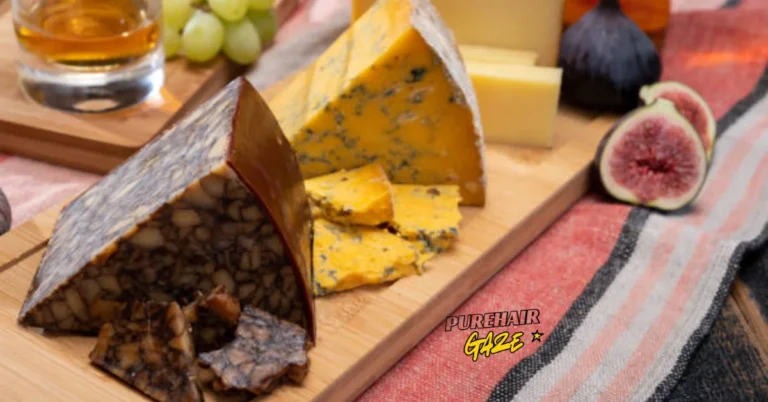Introduction
Ever heard of grouse cheese? At first glance, it sounds like something pulled straight out of a foodie’s daydream or a culinary experiment gone wild. But hold on—this unique creation isn’t just a quirky name. It’s an adventurous blend of two worlds: the bold, gamey essence of grouse (a type of bird) and the creamy, irresistible goodness of artisan cheese. Intrigued yet? You should be!
In this article, we’re diving deep into what makes grouse cheese so fascinating, how it’s produced, and why it might just be the next big thing in gourmet circles.
What Exactly is Grouse Cheese?
Grouse cheese isn’t your everyday cheddar or mozzarella. In fact, it’s not widely available at all. This rare treat is typically a soft or semi-hard cheese infused with the distinctive flavor of grouse meat. The result? A rich, earthy, and slightly gamey taste that stands out from traditional cheeses.
Key Characteristics
-
Texture: Ranges from creamy to slightly crumbly, depending on aging.
-
Flavor Profile: Bold, nutty, and subtly smoky with a wild game undertone.
-
Pairing Potential: Pairs exceptionally well with dark red wines, rustic breads, and even fig spreads.
The Origins of Grouse Cheese
Where did this peculiar fusion come from? Surprisingly, grouse cheese has roots in experimental European gastronomy, where chefs have long played with unconventional flavors. Scotland and Northern France, regions renowned for both wild game and artisanal cheese, are believed to be early pioneers of this culinary curiosity.
How is Grouse Cheese Made?
1. The Base: High-Quality Milk
Like any exceptional cheese, it begins with quality milk—cow, sheep, or goat.
2. Infusion of Grouse Essence
Here’s where things get interesting. Instead of simply flavoring the cheese with artificial additives, some gourmet makers use slow-cooked grouse stock, smoked grouse fat, or even finely ground meat during the curdling process.
3. Aging & Flavor Development
Aging can last from a few weeks to several months. The longer it matures, the deeper and more complex the flavor becomes—often developing nutty, earthy notes with a hint of wildness.
Why is Grouse Cheese So Rare?
Several factors make grouse cheese a rare gem:
-
Limited Availability of Grouse: Grouse is a seasonal bird, primarily hunted in the UK and parts of Europe.
-
Labor-Intensive Process: Infusing meat essence into cheese requires delicate balance to avoid overpowering flavors.
-
Niche Market Appeal: While adventurous foodies love it, grouse cheese is still a specialty item rather than a mainstream staple.
The Flavor Experience: What Does Grouse Cheese Taste Like?
Imagine biting into a soft, velvety cheese that carries a whisper of the wild—nutty, smoky, and slightly tangy. Some describe it as a cross between aged Gouda and pâté. Others say it tastes like a countryside feast captured in one bite. Either way, it’s definitely not for the faint-hearted!
Ways to Enjoy Grouse Cheese
1. On a Charcuterie Board
Pair it with cured meats, dried fruits, and artisan crackers. Add a drizzle of honey to balance its savory punch.
2. Melted Over Rustic Bread
Grilled sourdough with melted grouse cheese? Absolute perfection.
3. In Pasta or Risotto
A small crumble can elevate a creamy mushroom risotto or hearty pasta dish.
4. As a Bold Dessert
Surprisingly, some gourmet chefs serve it with dark chocolate and port wine for an adventurous twist.
Pairing Suggestions
-
Wine: A bold Cabernet Sauvignon or Syrah.
-
Beer: A dark ale or smoky porter.
-
Condiments: Fig jam, truffle honey, or caramelized onions.
Is Grouse Cheese Safe to Eat?
Absolutely! When made by reputable artisans, grouse cheese is carefully crafted under strict food safety standards. However, because it contains wild game, it’s best consumed fresh and stored properly.
FAQs About Grouse Cheese
1. Is grouse cheese vegetarian?
No. Since it contains essence or extracts of grouse meat, it’s not suitable for vegetarians.
2. Where can I buy grouse cheese?
Specialty cheese shops in the UK, gourmet food markets in France, or bespoke online vendors occasionally carry it.
3. Does it have a strong smell?
Not overwhelmingly so. It has a mild, gamey aroma but is far less pungent than blue cheese.
4. Can I make it at home?
Technically, yes—but it requires knowledge of cheese-making, food safety, and access to grouse meat. Definitely not a beginner’s project!
Why Foodies Are Falling in Love with Grouse Cheese
So why are people willing to pay top dollar for this elusive delicacy? Because it’s an experience—a chance to taste something truly one-of-a-kind. In a world filled with familiar flavors, grouse cheese dares to be different.
Conclusion
From its wild origins to its bold, unforgettable flavor, grouse cheese is a testament to culinary creativity. Whether you’re a daring foodie or just curious about unique gourmet experiences, this rare cheese promises a taste adventure like no other. So, next time you stumble across it at a specialty market—don’t hesitate. Take a bite, savor the wild, and let your taste buds thank you later.

